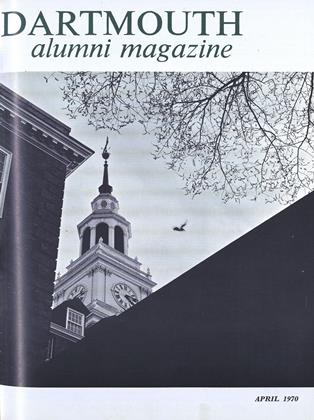Reporting on civil rights ... tuition hikes ... forecasts of disruption ... dissent and justice ... educators and politics
Turning Point? Over the past two years, the federal government increasingly put pressure on individual colleges and state college systems to end racial bias and provide greater opportunities for minority groups. But then: The top civil rights official in the Department of Health, Education, and Welfare resigned under fire. Congress showed a strong inclination to strip the department of its major administrative weapons against segregation. Vice-President Agnew denounced racial quota and "open admissions" in higher education. Suddenly there was much uncertainty about how vigorously the Administration would enforce the Civil Rights Act of 1964 on the nation's campuses.
'Universal Access': Everyone with a fair chance of academic success ought to be able to go to college if he wants to, says the prestigious Carnegie Commission on Higher Education. "Inequality of opportunity must not continue to sap the strength of our nation," the commission asserts in a special report. It calls for "universal access" to higher education and sets a deadline: 1976.
Rising Tuition: The pressure of inflation on education costs is forcing many colleges and universities, public and private, to raise tuition once again. "We must plan on regular annual increases in student charges over the foreseeable future," says an administrator in the Ivy League, where tuitions are heading for $2,500 and more a year.
Research First: President Nixon wants to be sure education programs work before he seeks large outlays of new funds. He has proposed a National Institute of Education "as a focus for educational research and experimentation."
Troubled Science: American science needs a lot more money to escape mediocrity, warns the National Science Board. It says that a lack of funds, especially from the federal government, is making it difficult for scientists to "respond to new ideas and new opportunities."
Turbulence Ahead: Amid increasing reports of renewed violence on a number of campuses, many college educators sense that the 1970's will be no less disruptive than the previous decade. "The peak of activism has not yet been reached," one university administrator told colleagues at a national conference. Others agreed. They said they expected urgent social problems to involve their institutions more deeply in off-campus affairs. Conversations also turned to such issues as the effect of open-admission policies on higher education, the financial plight of institutions, and changes in campus governance and the academic job market.
Campus Dissent: Colleges and universities have to maintain order; they cannot tolerate "the number and kinds of disruptions that have become commonplace." In making that observation, however, a special panel of attorneys and academic leaders also cautioned that "there is a risk that certain efforts to maintain order may themselves be excessive and may indirectly contribute to disruptions." Institutions should seek "order with justice," said the panel, a commission of the American Bar Association, and guarantee their students the right to dissent.
Recruiting Slowdown: Business firms are not looking for as many new college graduates as they used to. After a decade of expanding job opportunities, reports the College Placement Council, industry has reduced its campus recruiting this year by 16 per cent for bachelor's degree candidates, 26 per cent for master's degree candidates, and 14 per cent for Ph.D. candidates.
Private Support: Corporations gave $340-million 1to education in 1968, the Council for Financial Aid to Education estimated after a survey of 795 companies. Contributions were 13.3 per cent higher than those of 1966, although the rate of increase showed a decline. Still, said the council, "there has been no lessening of the business community's commitment to underwrite an important share of the voluntary support of higher education."
Campaign Fever: "We who have been in higher education have a feeling for ... why there is such a degree of impatience among many in the country," says Edwin D. Etherington. He has decided to give up the presidency of Wesleyan University and seek the Republican' nomination for U.S. Senator in Connecticut. Other college administrators and faculty members in several states also are seeking political office this spring.
PREPARED FOR OUR READERS BY THE EDITORS OF THE CHRONICLE OF HIGHER EDUCATION
 View Full Issue
View Full Issue
More From This Issue
-
 Feature
FeatureThe Dilemma of World Power
April 1970 By GENE M. LYONS, -
 Feature
FeatureRevival of the M.D. Degree
April 1970 -
 Feature
FeatureTHE KEMENY INAUGURATION
April 1970 -
 Article
ArticleThe Faculty
April 1970 By WILLIAM R. MEYER -
 Class Notes
Class Notes1935
April 1970 By RICHARD K. MONTGOMERY, GEORGE PRICE -
 Article
ArticleThe Undergraduate Chair
April 1970 By WINTHROP A. ROCKWELL '70
Features
-
 Feature
FeatureTRUSTEES SANCTION A FOURTH TERM
OCTOBER 1962 -
 Feature
Feature1960 Commencement
July 1960 By D.E.O. -
 Feature
FeatureNotebook
May/June 2013 By DARTMOUTH SPORTS INFORMATION -
 Feature
FeatureCommencement
June 1975 By JAMES L. FARLEY '42 -
 Feature
FeatureD’Souza’s America
JAnuAry | FebruAry By Matthew Mosk ’92 -
 Feature
FeatureThe Comprehensive Classroom:
JANUARY/FEBRUARY 1986 By Roger D. Masters and William C. Scott

